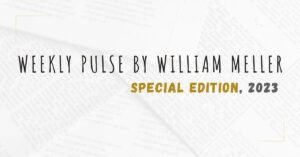The Weekly Pulse is my content curation and my highlights from readings, books, podcasts, insights, and everything I discovered during the week.
So, let’s go with some discoveries from the week!
#1 – Is That All There Is? Why Burnout Is A Broken Promise
#2 – The Hidden Traps in Decision-Making
#3 – A Theory of Zoom Fatigue
Is That All There Is? Why Burnout Is A Broken Promise
Source: Refinery29
Author: Whizt Kim
Summary: In the story of our lives, we might be the main character, but work is the dominating theme, our constant motivation. It’s the central thing we do as adults, the primary focus of our mental function for most hours of the day, most days of the week.
3 Highlights:
“… Maybe a telltale sign of burnout is when you start thinking in such extreme terms, ruminating on life and death as it pertains to your work satisfaction. If you’re wondering what would happen if you died tomorrow, and weighing how deeply your workplace would feel the loss of you, you’re not just tired. You’re preoccupied with existential questions related to meaning and purpose. And they’re all related to your job…”
“… There’s a lot of debate about what exactly burnout is: A medical condition? A philosophical matter? Is it just the cost of doing business? Of being alive? According to the World Health Organization, it’s an “occupational phenomenon.” But that seems to be an anodyne way of saying that the exact nature, cause, and solution to burnout aren’t entirely clear…”
“… And yet, in the depths of disillusionment and burnout, there can also sometimes be a strange sense of freedom in recognizing that work might never provide the purpose and emotional sustenance you once believed it would. And that’s okay. You’ll survive. Collectively, we will simply need to come up with a new way of thinking about work. It turns out, works — like any relationship — isn’t the be-all, end-all we’d thought it could be…”
Access full Weekly Pulse reading here >>
The Hidden Traps in Decision-Making
Source: Harvard Business Review
Author: John S. Hammond, Ralph L. Keeney, and Howard Raiffa
Summary: Making good decisions is essential for success in business, and bad decisions can be damaging to a career or business. Poor decisions often have their roots in the way decisions are made, but sometimes they result from flaws in the decision-makers thinking. These psychological traps are especially hazardous to executives. To make sound decisions, management can learn to understand these traps and compensate for them. In this article, several psychological traps are explained, including the status-quo trap, the sunk-cost trap, the framing trap, and the overconfidence trap. For each trap, the author provides techniques that take into account human biases to ensure decision-making is more reliable.
3 Highlights:
“… To avoid the prudence trap, always state your estimates honestly and explain to anyone who will be using them that they have not been adjusted. Emphasize the need for honest input to anyone who will be supplying you with estimates…”
“… A dramatic first impression might anchor our thinking, and then we might selectively seek out confirming evidence to justify our initial inclination. We make a hasty decision, and that decision establishes a new status quo. As our sunk costs mount, we become trapped, unable to find a propitious time to seek out a new and possibly better course. The psychological miscues cascade, making it harder and harder to choose wisely…”
“… As we said at the outset, the best protection against all psychological traps—in isolation or in combination—is awareness. Forewarned is forearmed. Even if you can’t eradicate the distortions ingrained into the way your mind works, you can build tests and disciplines into your decision-making process that can uncover errors in thinking before they become errors in judgment. And taking action to understand and avoid psychological traps can have the added benefit of increasing your confidence in the choices you make…”
Access full Weekly Pulse reading here >>
A Theory of Zoom Fatigue
Source: The Convivial Society
Author: L. M. Sacasas
Summary: Why is video conferencing so exhausting? The question is worth asking because it is helpful to understand what’s involved in an activity many of us cannot now avoid. It’s also worth asking because it helps us understand how human communication works under ordinary circumstances.
3 Highlights:
“… The problem with video conferencing is that the body is but isn’t there. This means that our minds are at least partly frustrated as they deploy their non-conscious repertoire of perceptive skills. The situation is more like a face-to-face encounter than most any other medium, but, for that very reason, it frustrates us because it is, nonetheless, significantly different. I suppose we might think of it as something like a conversational uncanny valley. The full range of what the mind assumes should be available to it when it perceives a body simply isn’t there…”
“… Faces are present to us, but typically at a less than ideal distance, making it difficult to perceive the subtle cues we rely on to gauge whether someone is following along, interested, confused, disengaged, etc. The more participants, the smaller the screen, the harder to pick up such cues…”
“… Right now, most everything is operating in a less than ideal manner, and we’re fumbling our way toward some version of “good enough.” But in order to use these tools well, it’s worth reckoning with what Zoom or Skype can and cannot do. We should understand how they might be undermining our stated objectives, and we should be clear about what we are asking of others when we mandate their use…”
Access full Weekly Pulse reading here >>
Do you want to get new content in your Email?
I am incredibly grateful that you have taken the time to read this Weekly Pulse.
The Weekly Pulse is an important section of this website, aiming to share good stuff with you every week!
Do you want to explore more? Check more Weekly Pulse content here.
Check my main categories of content below:
- Agile
- Blog
- Book Notes
- Career
- Leadership
- Management
- Managing Yourself
- Productivity
- Project Management
- Technology
- Weekly Pulse
Navigate between the many topics covered in this website:
Agile Art Artificial Intelligence Blockchain Books Business Business Tales Career Coaching Communication Creativity Culture Cybersecurity Design DevOps Economy Emotional Intelligence Feedback Flow Focus Gaming Goals GPT Habits Health History Innovation Kanban Leadership Lean Life Managament Management Mentorship Metaverse Metrics Mindset Minimalism Motivation Negotiation Networking Neuroscience NFT Ownership Parenting Planning PMBOK PMI Politics Productivity Products Project Management Projects Pulse Readings Routines Scrum Self-Improvement Self-Management Sleep Startups Strategy Team Building Technology Time Management Volunteering Work
Do you want to check previous Weekly Pulse posts? Check the last couple of weeks:
- Weekly Pulse by William Meller | Special Edition, 2023
- Weekly Pulse by William Meller | Week 51, 2023
- Weekly Pulse by William Meller | Week 50, 2023
- Weekly Pulse by William Meller | Week 49, 2023
- Weekly Pulse by William Meller | Week 48, 2023
Support my work by sharing my content with your network using the sharing buttons below.
Want to show your support tangibly? A virtual coffee is a small but nice way to show your appreciation and give me the extra energy to keep crafting valuable content! Pay me a coffee:





